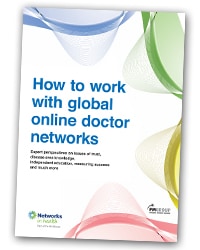
Most senior pharma executives recognise that pharma lags behind many other industries in using digital tactics for effective sales and marketing. In fact, statistics show that, globally, the pharma industry spends only 15.3 per cent of its marketing budgets on digital (Across Health 2013), and most of this continues to be devoted to brand.com websites.
But how does pharma’s digital reticence correlate with doctors’ growing reliance on the Internet for their daily work? And what insights can independent online professional networks, which are used by more than three million doctors worldwide, provide on the way in which doctors prefer to engage with pharma?
This supplement is sponsored by Networks in Health, the unique global alliance of trusted online physician communities with more than two million physician members worldwide (and 760,000 in Europe). In it, our partners in Germany, Russia, Latin America, Canada and the UK share their expertise on a variety of digital engagement topics and provide insights into levels of digital activity in their respective countries.
We start with an overview of independent online networks and then cover a number of key themes: including trust; identifying disease area knowledge; the value of independent education; how digital tactics can be used to support a reduced sales force; and measurement and ROI.
Beverly Stainsby, of Networks in Health, explains how pharma needs first to listen to doctors and then act on their feedback in order to win their trust and deepen engagement. This is followed by an article from Simon Grime, also of Networks in Health, who explains how sharing relevant and timely information builds trust, and encourages doctors to be more receptive to information about pharmaceutical products.
Oxana Kolosova, of iVrach.com, looks at the specific types of data that doctors need in Russia and Daniel Sanmarco, of Medcenter, explains how pharma can capitalise on knowledge gaps in Latin America, where a lack of specialists outside cities means a lot of illnesses are not diagnosed or treated.
The value of investing in independent education is assessed by David Schmeler, of mdBriefcase in Canada, who explains why many doctors want impartial, third party resources; while Mariel Aristu, of Medcenter, writes on the way in which digital channels can transform pharma/doctor relationships in Latin America’s vast territories, where it is impossible to deploy sales teams outside the big cities.
In the final section, Felix Rademacher, of coliquio in Germany, answers the question on all pharma marketers’ lips – how can independent online communities help them to measure success and deliver ROI? And we round off with a case study on how this approach can impact on, and complement, sales force activity.
View: How to work with global online doctor networks
I hope this supplement provides useful insights into the way in which doctors are interacting with independent online resources in key countries across the globe and the opportunities that exist for pharma to deepen engagement and deliver real ROI. The team at Networks in Health welcome your feedback, so please do join in the discussion @netwrksinhealth.
Dr Tim Ringrose is CEO of Networks in Health, the unique global alliance of trusted online physician communities. To learn more email: info@networksinhealth.com or visit: www.networksinhealth.com





